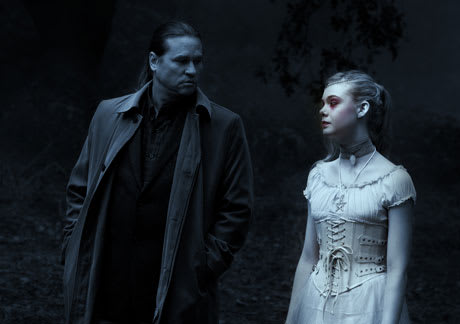Acting as a self-reflexive ode to Edgar Allan Poe, with requisite tongue-in-cheek jokes about reading "The Raven" aloud, as well as a testament to the unconscious nature of writing what you know and the gamut of gothic horror roots in cinematic history, Twixt, Francis Ford Coppola's latest dalliance with pretence, is nothing if not learned.
Coppola uses colour and textures, referencing old standbys like clock towers and lost innocence, using 3D only briefly as a nod to variation, much like the black & white dream sequences stained with red and bright lights to create an otherworldly feel.
It's just a shame that this story of bargain basement horror writer Hall Baltimore (Val Kilmer) rediscovering his voice in a small, mysterious town with an unsolved murder serves no purpose beyond validating Coppola's knowledge and exploration of the textures of film.
Much like Tetro and Youth Without Youth, there's little going on beyond stylistic whimsy and academic winks, only with Twixt there's at least a tenet of self-aware humanity, in the acknowledgement that art is often the result of our own pain, here embodied by the death of a child.
Because this ersatz-vampire movie is essentially a giant art film flub, the linear plot description of a writer researching a mystery to fuel his new novel doesn't cover the experience. Said writer has hallucinogenic dreams, with a young, creepy buck-toothed girl in a corset (Elle Fanning) that detail an old manor where dead children were buried under a floor. He also talks to Edgar Allan Poe (Ben Chaplin) about the nature of writing, when not collaborating with a potentially unstable Sheriff (Bruce Dern) about a vampire story while lucid.
As mentioned, there are 3D breaks when the action unfolds, which doesn't come off as strange in a film where time is fluid and Kilmer randomly impersonates homosexual '60s basketball players while writing a treatment about fog on a lake. Everything has a double meaning or reference, unsurprisingly, but the sum of its parts leaves much to be desired, despite occasionally being laugh-out-loud funny.
Somewhere within here is a work of brilliance, but unfortunately, it's buried beneath Coppola's indulgence and inability to see the world beyond his privileged, heteronormative angst.
Twixt is the sort of garish art film you might expect from a well-educated person that's never once stepped back to question anything the world has handed down to them.
(American Zoetrope)Coppola uses colour and textures, referencing old standbys like clock towers and lost innocence, using 3D only briefly as a nod to variation, much like the black & white dream sequences stained with red and bright lights to create an otherworldly feel.
It's just a shame that this story of bargain basement horror writer Hall Baltimore (Val Kilmer) rediscovering his voice in a small, mysterious town with an unsolved murder serves no purpose beyond validating Coppola's knowledge and exploration of the textures of film.
Much like Tetro and Youth Without Youth, there's little going on beyond stylistic whimsy and academic winks, only with Twixt there's at least a tenet of self-aware humanity, in the acknowledgement that art is often the result of our own pain, here embodied by the death of a child.
Because this ersatz-vampire movie is essentially a giant art film flub, the linear plot description of a writer researching a mystery to fuel his new novel doesn't cover the experience. Said writer has hallucinogenic dreams, with a young, creepy buck-toothed girl in a corset (Elle Fanning) that detail an old manor where dead children were buried under a floor. He also talks to Edgar Allan Poe (Ben Chaplin) about the nature of writing, when not collaborating with a potentially unstable Sheriff (Bruce Dern) about a vampire story while lucid.
As mentioned, there are 3D breaks when the action unfolds, which doesn't come off as strange in a film where time is fluid and Kilmer randomly impersonates homosexual '60s basketball players while writing a treatment about fog on a lake. Everything has a double meaning or reference, unsurprisingly, but the sum of its parts leaves much to be desired, despite occasionally being laugh-out-loud funny.
Somewhere within here is a work of brilliance, but unfortunately, it's buried beneath Coppola's indulgence and inability to see the world beyond his privileged, heteronormative angst.
Twixt is the sort of garish art film you might expect from a well-educated person that's never once stepped back to question anything the world has handed down to them.
